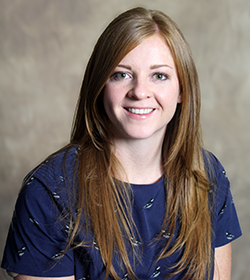
After an astronaut returns to earth from a mission – and even during their space flight - they are thoroughly examined to determine how space travel affects the human body. Part of that research takes place within CLASS’s Health and Human Performance department, and one of those researchers was PhD candidate Hawley Kunz.
“My faculty advisor, Dr. Richard Simpson, has been awarded grants from NASA to study the effects of spaceflight and its associated stressors on the immune system,” says Kunz. “As part of Dr. Simpson’s lab, I became involved in his NASA-funded studies, helping to process and analyze blood and saliva samples that arrived from astronauts on the space station.”
“Hawley’s efforts have been instrumental to the ongoing success of my current NASA-funded research agenda and she has become fully immersed in the world of spaceflight immunology,” says Dr. Simpson, an associate professor of Health and Human Performance.
Working with Dr. Simpson led to a new opportunity for Kunz when NASA decided to grow their immunology lab. He recommended her for a position within the newly expanded lab – and she interned within that lab for a year under the guidance of the lead immunologist at the NASA Johnson Space Center. That position let to her being hired as a scientist in the NASA immunology lab with Wyle, a NASA contractor.
“In my current position, I facilitate ongoing research endeavors by performing assays and developing protocols. I am also assisting with the preparation of manuscripts and research presentations,” she says.
Working in a research lab is a different career path than what she originally envisioned after graduating from Mercer University in 2010. As an undergraduate, she had earned a BS in biology, a minor in chemistry, and had initial plans to go to medical school.
“However, during my senior year of college, I shadowed an orthopedic surgeon and it became clear to me that medicine was not the path for me. Feeling somewhat panicked, I struggled to find a new path,” she recalls.
A family friend who worked for a NASA contractor recommended she consider the University of Houston’s Health and Human Performance department.
“As I researched the school, I found that the Department of Health and Human Performance offered a wide range of research topics within the field, and the faculty were clearly leaders in exercise physiology research,” she says.
Kunz says that she always found the human body interesting – its capabilities, its functioning, and its potential, which is why she initially believed she would pursue a career in medicine. As an undergraduate she had an internship working with a physical therapist and exercise physiologist that she enjoyed. And she knew that she had always found solace from the stress of school with exercise.
Now that she had a plan, she packed up and moved to Houston. However, graduate school proved to be more of a challenge than Kunz expected. Although she now knew she wanted to pursue a degree in exercise physiology, she didn’t have a clear idea of what, precisely, she wanted to study within the field.
Kunz recalls, “Much of my first two years of graduate school were spent trying to develop a research agenda that best fit my interests. It was a difficult two years, and many times I felt that I was not cut out for a PhD program.”
That is when Dr. Simpson stepped in, provided her with research opportunities, and showed her that if she put in the work, she has the ability to complete her degree.
Kunz is scheduled to complete her doctorate degree at the end of the summer. Her dissertation examines whether an increased number of virus-specific immune cells can be grown from blood obtained after 30 minutes of cycling, since a single bout of exercise has a large impact on the immune system. This research could potentially improve the treatment of immunocompromised individuals with viral infections.
Currently, in her position at Wyle she works within a state-of-the-art lab at Johnson Space Center. She envisions continuing in her position for the foreseeable future.
“I will have the opportunity to work with astronauts in an effort to maintain and improve their health during future exploration-class missions,” she says.
Dr. Simpson adds, “Hawley has proven to be an extremely dedicated, productive and motivated student. She has great intellect, and is one of the most dedicated and hardworking students I’ve ever had the pleasure to work with.”
- By Monica Byars